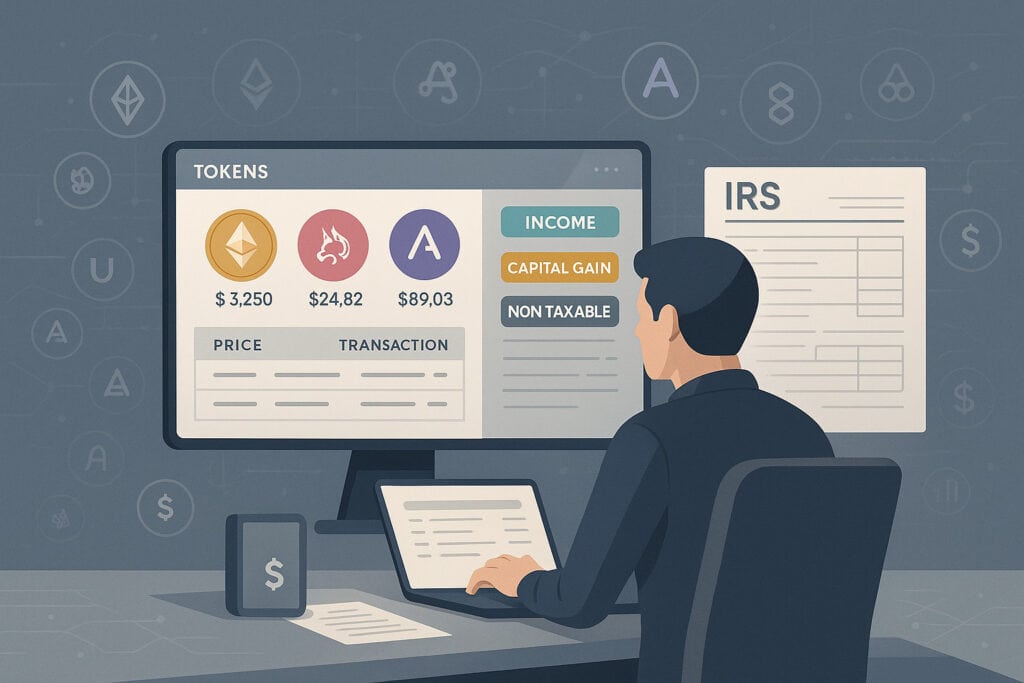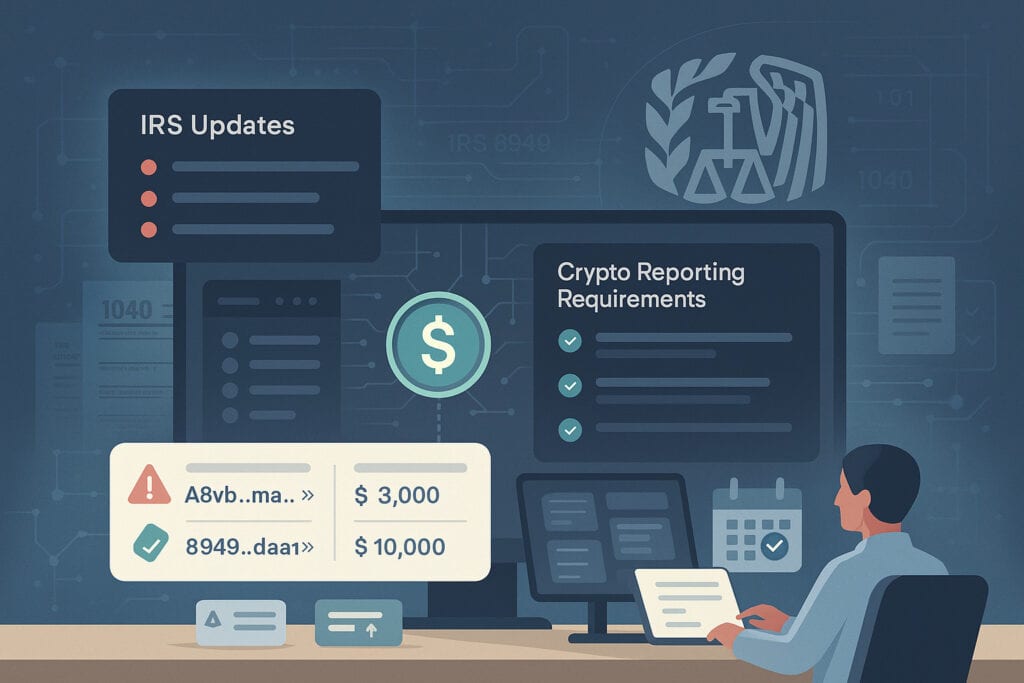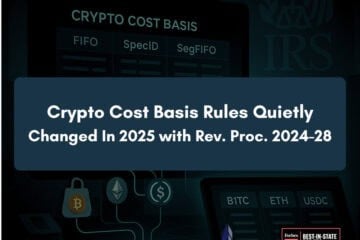Last Updated on September 25, 2025 by Patrick Camuso, CPA
Why Token Taxation Matters
Tax rules for tokens aren’t just a niche concern anymore. With digital assets projected to grow into the tens of trillions by 2030, the IRS is taking token activity seriously. Whether you’re trading cryptocurrencies, minting NFTs, or receiving tokens as compensation, each move has tax consequences. The stakes are high: audits, penalties, and even criminal charges can arise from misreporting.
At Camuso CPA, we see token tax not as a burden but as an opportunity to apply smart strategies that minimize liability while keeping you compliant.
Key Takeaways
- Tokens are treated as property, meaning transactions can trigger either capital gains or ordinary income tax.
- Token activity includes trading, staking, NFTs, compensation, and wallet activity — all reportable under IRS guidelines.
- Fair Market Value (FMV) is critical for compliance, but volatility makes accurate valuation difficult.
- New IRS reporting rules, including Form 1099-DA beginning in 2025, expand broker obligations.
- Professional expertise ensures accurate filings and reduces audit risk.
Why Valuation Matters
FMV is central to token tax reporting. Volatility makes this challenging, which is why independent third-party valuations or reliable exchange data are often recommended. The IRS expects consistent, well-documented valuation methods that can withstand scrutiny in an audit.
IRS Updates and Compliance
The IRS has tightened reporting requirements:
- Form 1099-DA will standardize digital asset reporting, including gross proceeds, gains, and losses.
- Expanded broker reporting rules start in 2025, increasing oversight.
- Civil fines of up to $100,000 and criminal penalties apply for non-compliance.
The message is clear: the IRS is scaling up enforcement to match the growth of digital assets.
Investor Implications
For investors, the timing of sales and holding periods can significantly change tax outcomes. Short-term gains (one year or less) are taxed at ordinary income rates, while long-term gains (more than one year) benefit from lower rates. Patrick Camuso, CPA, explains: “Knowing when to sell or hold tokens is one of the most important tax decisions an investor can make. Strategic timing can save thousands in taxes.”

Looking Ahead: The Future of Token Taxation
Token taxation is still evolving. As more assets become tokenized, the IRS will continue to refine its approach. Proactive planning, accurate valuations, and consistent reporting are the best defenses against liability.
Key Takeaway: Staying ahead of IRS rules isn’t optional. With the right strategy, you can reduce tax burdens, stay compliant, and position yourself for long-term success.
Compliance and Reporting Obligations
Section 6045 of the Internal Revenue Code requires that taxable token events — sales, exchanges, and compensation — be reported. Companies must withhold applicable taxes and file reports with the IRS. Investors must keep meticulous records of FMV, transaction dates, and transfers.
Starting in 2026, Form 1099-DA will cover transactions from 2025, simplifying compliance for many taxpayers.
Looking Ahead: The Future of Token Taxation
Token taxation is still evolving. As more assets become tokenized, the IRS will continue to refine its approach. Proactive planning, accurate valuations, and consistent reporting are the best defenses against liability.
Key Takeaway: Staying ahead of IRS rules isn’t optional. With the right strategy, you can reduce tax burdens, stay compliant, and position yourself for long-term success.

Valuation of Tokens and Fair Market Value (FMV)
Determining the FMV of tokens and their transfer can be challenging due to the volatility of token markets. For tax purposes, companies and individuals should use the price at which tokens are traded on exchanges or other reliable sources working on a distributed ledger.
The IRS expects FMV to be based on a reasonable and well-documented methodology to withstand scrutiny during audits.
Tax Implications for Token Investors
Investors who receive tokens, either as compensation or as an employee through investment, must consider the tax implications. When tokens are sold or exchanged, investors face capital gains tax, with rates depending on how long the tokens were held during the year. If tokens are received as compensation, they are taxed as ordinary income. Employees recognize ordinary income at the time restricted tokens are vested if no 83(b) election is filed.
For many investors, holding tokens for more than a year can result in favorable long-term capital gains tax rates, which are typically lower than short-term rates, particularly when considering market prices.
Patrick Camuso, CPA: “Understanding when to sell or hold tokens is critical for minimizing tax liabilities, especially for a developer involved in implementing token solution. For example, planning strategically around these decisions can significantly impact your overall tax burden.”
Tax Planning Strategies for Token Awards
Companies can optimize their tax outcomes by structuring token awards as restricted or unrestricted, based on the rights granted to employees. Timing grants and aligning vesting schedules with favorable market conditions can also help minimize tax liability, especially when dealing with multiple units of tokens.
Additionally, companies must comply with tax withholding and reporting obligations for token awards, similar to equity awards.
For investors, holding tokens for the long term to qualify for lower long-term capital gains tax rates can provide significant tax savings. Additionally, tax-loss harvesting, selling a number of ssets at a loss to offset gains, can be an effective way to reduce taxable income.
Compliance and Reporting for Token Taxation
Both companies and investors must meet various compliance and reporting obligations for tokens. A number of token sales, exchanges, or other taxable events must be reported on annual tax returns as required under Section 6045 of the Internal Revenue Code and subsequent sections.
Companies issuing token-based compensation must withhold applicable taxes and report them to the IRS. By the end of the 1930s, the use of sales tax tokens was eliminated in most issuing states. Georgia adopted an early sales tax in 1929 during the economic crisis.
To ensure full compliance and to establish a connection between transactions, it’s essential to maintain detailed records of FMV determinations, token transfers, and transaction dates. Starting in 2026, Form 1099-DA will be issued for transactions conducted in 2025, further simplifying the reporting process.
Conclusion: The Future of Token Taxation
Token taxation continues to evolve, with regulatory changes like Form 1099-DA likely impacting compliance and creating various issues for taxpayers. As the market for tokenized assets grows, understanding token tax treatment will become even more critical for both companies and investors, especially if assets are blocked due to regulatory issue.
In addition, prioritizing compliance and accurate tax reporting will help minimize liabilities and avoid penalties.
Key Takeaway: Proactive planning, accurate valuations, and timely reporting are essential to staying compliant with IRS regulations and minimizing token-related tax liabilities.
Frequently Asked Questions (FAQs)
Is token taxation legitimate? Yes. Token transactions are recognized under the Internal Revenue Code and must be reported.
Do I need to report token transactions under $600? Yes. All taxable transactions must be reported regardless of size.
Are token transactions tax-free? No. Unless exempted by law, token transactions are subject to income or capital gains tax.
Does sales tax apply to tokens? In some jurisdictions, yes. If tokens are exchanged for taxable goods or services, sales tax may apply. Businesses must check local rules.
Need Help with Token Taxation?
Understanding token taxation can be complex, especially with ongoing regulatory updates.
At Camuso CPA, we help businesses and individuals, including developers, navigate the intricacies of token-related tax obligations.
Contact us today to discuss how we can support your compliance efforts and help minimize your tax liabilities.






